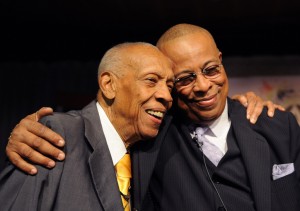 José D. Fernández (born July 31, 1992) is a Cuban professional baseball pitcher for the Miami Marlins of Major League Baseball (MLB). He bats and throws right-handed. He made his MLB debut in the 2013 season.
José D. Fernández (born July 31, 1992) is a Cuban professional baseball pitcher for the Miami Marlins of Major League Baseball (MLB). He bats and throws right-handed. He made his MLB debut in the 2013 season.
Fernández grew up in Santa Clara, Cuba. His stepfather, Ramon Jimenez, defected from Cuba in 2005, settling in Tampa, Florida. José attempted to defect unsuccessfully three times, with each failed defection attempt followed by a prison term.
José and his mother and sister defected in 2008. On that successful attempt, José’s mother fell overboard when the boat hit turbulent waters, and José had to dive into the water to save his mother’s life.
When in US he enrolled at Braulio Alonso High School in Tampa, Florida, and was selected by the Marlins in the first round of the 2011 MLB Draft. Fernández made his MLB debut with the Marlins on April 7, 2013. He was named to the 2013 MLB All-Star Game and won the National League (NL) Rookie of the Month Award in July and August. After the season, he won the NL Rookie of the Year Award, and finished third in Cy Young Award balloting.
Knowing Orlando Chinea, a coach who had trained some of Cuba’s top pitchers before he defected from Cuba, lived in the area, Jimenez had his son train with Chinea. He attended Braulio Alonso High School in Tampa, Florida. Playing on the high school baseball team, Fernández was part of the Florida Class 6A state champions in his sophomore and senior seasons. As a senior, Fernández pitched to a 13–1 win–loss record with a 2.35 earned run average (ERA) and 134 strikeouts. He also threw two no-hitters.
Professional career.
Draft and minor leagues.
The Florida Marlins drafted him in the first round, with the 14th overall selection, of the 2011 Major League Baseball Draft. Fernández signed with the Marlins, receiving a $2 million signing bonus. After he signed with the Marlins, he was assigned to the Jamestown Jammers of the Class A-Short Season New York-Penn League.
Fernández pitching for the Jupiter Hammerheads in 2012. Pitching for the Greensboro Grasshoppers of the Class A South Atlantic League (SAL) to start the 2012 season, Fernández threw the first six innings of a combined no-hitter. He was twice named the SAL pitcher of the week. Fernández was named to appear in the 2012 All-Star Futures Game. During the season, he was promoted to the Jupiter Hammerheads of the Class A-Advanced Florida State League. He finished the 2012 season with a 14–1 win-loss record, a 1.75 ERA, and 158 strikeouts in 134 innings pitched at Greensboro and Jupiter. He was named the Marlins’ Minor League Pitcher of the Year.
Miami Marlins (2013-present).
2013 season: Rookie of the Year.
Prior to the 2013 season, he was ranked as the Marlins’ best prospect and fifth best prospect in all of baseball by Baseball America. The Marlins invited Fernández to spring training, but sent him to minor league camp before the season began. However, they chose to add Fernández to the 25-man Opening Day roster, due in part to injuries to Nathan Eovaldi and Henderson Alvarez. Also, Marlins owner Jeffrey Loria hoped that promoting Fernández would buy him goodwill with the fans, following a fire sale the previous offseason. He was planned to be limited to approximately 150 to 170 innings during the 2013 season in order to protect his development.
The Marlins scheduled his major league debut on April 7, against the New York Mets. In his MLB debut, Fernández pitched five innings, allowing one run on three hits with eight strikeouts. He became the seventh pitcher under the age of 21 to record at least eight strikeouts in his MLB debut since 1916. He impressed in his second start. Despite a rough outing against the Tampa Bay Rays on May 27, Rays’ manager Joe Maddon took to Twitter soon after watching Fernández pitch, saying, “Jose Fernandez might be the best young pitcher I’ve ever seen, at that age. I believe he will go far.”
On July 6, 2013, Fernández was selected to represent the Miami Marlins for the National League All Star team. He pitched a perfect 6th inning in the 2013 All-Star Game in which he struck out Dustin Pedroia, induced Miguel Cabrera to pop up for a flyout and struck Chris Davis out. With this performance Fernandez is one of only three pitchers in the history of the All-Star Game who struck out two batters prior to their 21st birthday for their All-Star debut, the other two being Dwight Gooden and Bob Feller.
Against the Pittsburgh Pirates on July 28, Fernández recorded 13 strikeouts, earning the 3–2 victory. With Fernández’s 14 strikeout performance against the Cleveland Indians on August 3, 2013, he became just the sixth pitcher since 2000 to strike out 13 or more batters in consecutive games. He established the Marlins’ rookie record for most strikeouts in one game. On the heels of his performance in July 2013, Fernández was named the Rookie of the Month for the National League, leading all qualified rookie pitchers in the ERA category. He followed up his July month with a tremendous August, in which he compiled a 1.15 ERA with 49 strikeouts in 39 innings pitched, which resulted him in receiving a consecutive Rookie of the Month for the month of August 2013.
Fernandez’s rookie season has been considered historic as his 4.2 Wins Above Replacement places him in the Top 10 player seasons among those under 21 years old since 1900. Fernandez’s Adjusted ERA+ of 174 on the season also places him in the Top 10 all-time for pitchers under the age of 21, and is only the fourth pitcher to record this feat in the past 100 years. His strikeout rate is the highest in his league, pacing the National League at 9.81 strikeouts per nine innings.
On September 11, 2013, Fernandez hit his first career home run off of Atlanta Braves pitcher Mike Minor. After crossing home plate, Fernandez was confronted by Brian McCann which then led to a bench-clearing fracas.
At the time after his last start of his rookie season, Fernandez was in the top 10 of many pitching statistics in the National League, including sixth in strikeouts (187), first in Strikeouts per nine innings (9.75) and hits allowed per nine innings (5.759), second in ERA (2.19) and Adjusted ERA+, and third in rWAR (6.3).
Fernandez won the Sporting News Rookie of the Year Award and the Major League Baseball Rookie of the Year Award in the National League. He came in third place in the Cy Young Award voting behind Adam Wainwright and winner Clayton Kershaw.
http://youtu.be/Wta-AsqxZnI
2014 season.
Fernández started his sophomore campaign as the Opening Day starter for the Marlins, making him the youngest opening day starting pitcher since Dwight Gooden in 1986. Fernández recorded nine strikeouts while walking none, and joining Bob Gibson, Steve Carlton, Ferguson Jenkins, Walter Johnson, and Cy Young as the only pitchers to do so on Opening Day. On May 12, Fernandez was placed on the 15-day disabled list due to a right elbow sprain. An MRI revealed that the elbow had a torn UCL, which prematurely ended Fernandez’s 2014 season. He underwent Tommy John surgery on May 16. He made 8 starts going 4-2 with a 2.44 ERA and 70 strikeouts in 2014.
Personal.
Fernández considers his grandmother, Olga, the “love of [his] life”. After six years apart, Olga and José were reunited in Miami after the 2013 season.
Agencies/Various/Wiki/InternetPhotos/youtube/thecubanhistory.com
The Cuban History, Hollywood.
Arnoldo Varona, Editor.













